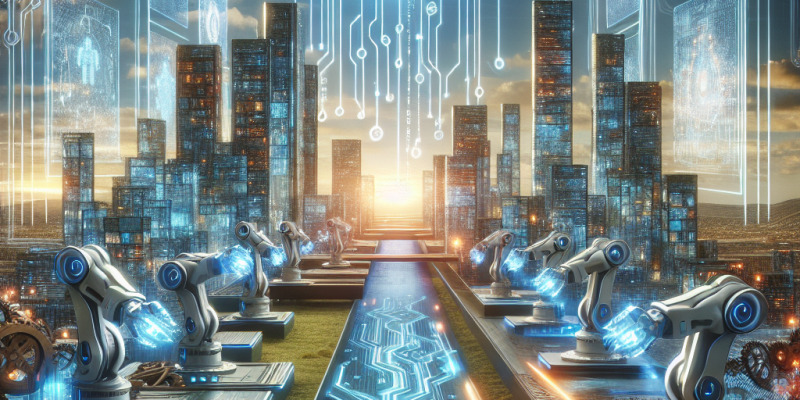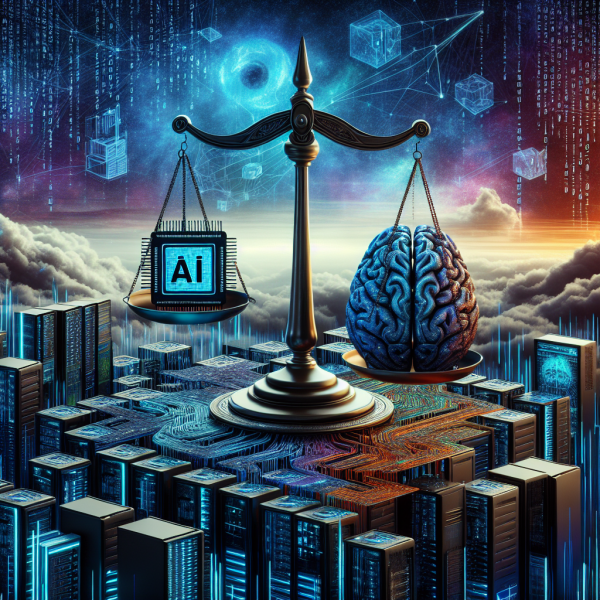AI-Powered Automation: The Catalyst for Innovation in the Digital Era

In the contemporary landscape of technological evolution, Artificial Intelligence (AI) stands at the forefront, reshaping how businesses operate and discover new avenues for growth. Coupled with automation, AI serves as a powerful catalyst for innovation, enabling organizations to navigate the complexities of the digital era with unprecedented agility and efficiency. This article explores the transformative impact of AI-powered automation on various sectors, its role in fostering creativity, and the future it promises to carve out for businesses and society at large.
Redefining Efficiency and Productivity
AI-powered automation has revolutionized operational efficiency by streamlining processes that were previously time-consuming and prone to human error. Tasks such as data entry, inventory management, and customer service, which once required significant human intervention, can now be managed by intelligent algorithms that learn and adapt over time.
For example, chatbots equipped with natural language processing can handle customer inquiries 24/7, providing immediate responses and freeing human agents to tackle more complex issues. Additionally, supply chain operations benefit from AI’s predictive analytics, enabling businesses to optimize inventory levels, manage logistics, and anticipate market demands, thereby minimizing waste and maximizing productivity.
Driving Innovation across Industries
Innovation is often synonymous with change, and AI-powered automation is at the heart of transformative changes sweeping across industries. From healthcare to finance, manufacturing to retail, AI is helping businesses adapt and innovate in response to consumer needs and market dynamics.
-
Healthcare: In the medical field, AI-driven automation streamlines administrative processes such as patient scheduling and billing, allowing healthcare providers to focus more on patient care. Moreover, AI algorithms analyze vast amounts of patient data to generate insights for personalized medicine and predictive diagnostics, paving the way for innovative treatments.
-
Finance: In finance, AI automates compliance processes and fraud detection, enabling institutions to respond more quickly to threats and regulatory changes. Algorithmic trading leverages AI to analyze market trends in real time, leading to smarter investment decisions.
-
Manufacturing: The rise of "smart factories" reflects how AI and automation combine to boost manufacturing efficiency. Robots equipped with AI can adapt to production line changes, learn new tasks, and even perform predictive maintenance, thus reducing downtime and increasing output.
- Retail: In retail, AI-driven automation enhances inventory management and personalizes customer experiences. Relying on data analytics reshapes marketing strategies, ensuring that customers receive tailored recommendations, thus improving conversion rates and customer satisfaction.
Enhancing Creativity and Human Collaboration
One might argue that automation threatens jobs and stifles creativity; however, the reality is quite the opposite. AI-powered automation acts as a complementary tool that augments human capabilities, thereby sparking creativity and innovation. By offloading routine tasks, employees can devote their energy to critical thinking, strategy development, and creative problem-solving.
Additionally, AI tools equipped with machine learning capabilities are providing creators in art, music, and literature with new avenues for expression. Artists are using AI to generate unique works of art, composers to explore new musical landscapes, and writers to analyze large datasets, drawing inspiration and insights that were previously unattainable.
Ethics and the Future of AI-Powered Automation
While the benefits of AI-powered automation are vast, ethical considerations surrounding its implementation cannot be overlooked. Issues related to data privacy, bias in AI algorithms, and the potential for job displacement must be addressed proactively. Organizations must adopt transparent AI practices and foster inclusive environments to ensure that the benefits of this technology are equitably distributed.
As we move into the future, the integration of AI-powered automation will continue to evolve. The ability of organizations to harness data, capitalize on technological advancements, and prioritize ethical considerations will require adaptive leadership and a commitment to continuous innovation.
Conclusion
AI-powered automation is more than a technological trend; it is a fundamental shift in how businesses operate and innovate. By enhancing efficiencies, driving innovation across diverse sectors, and augmenting human creativity, AI transforms the digital landscape, becoming an indispensable ally in the pursuit of progress. As we embrace this new era, the onus lies on businesses, policymakers, and society to navigate the complexities of AI thoughtfully, ensuring that its potential as a catalyst for innovation is realized for generations to come.














